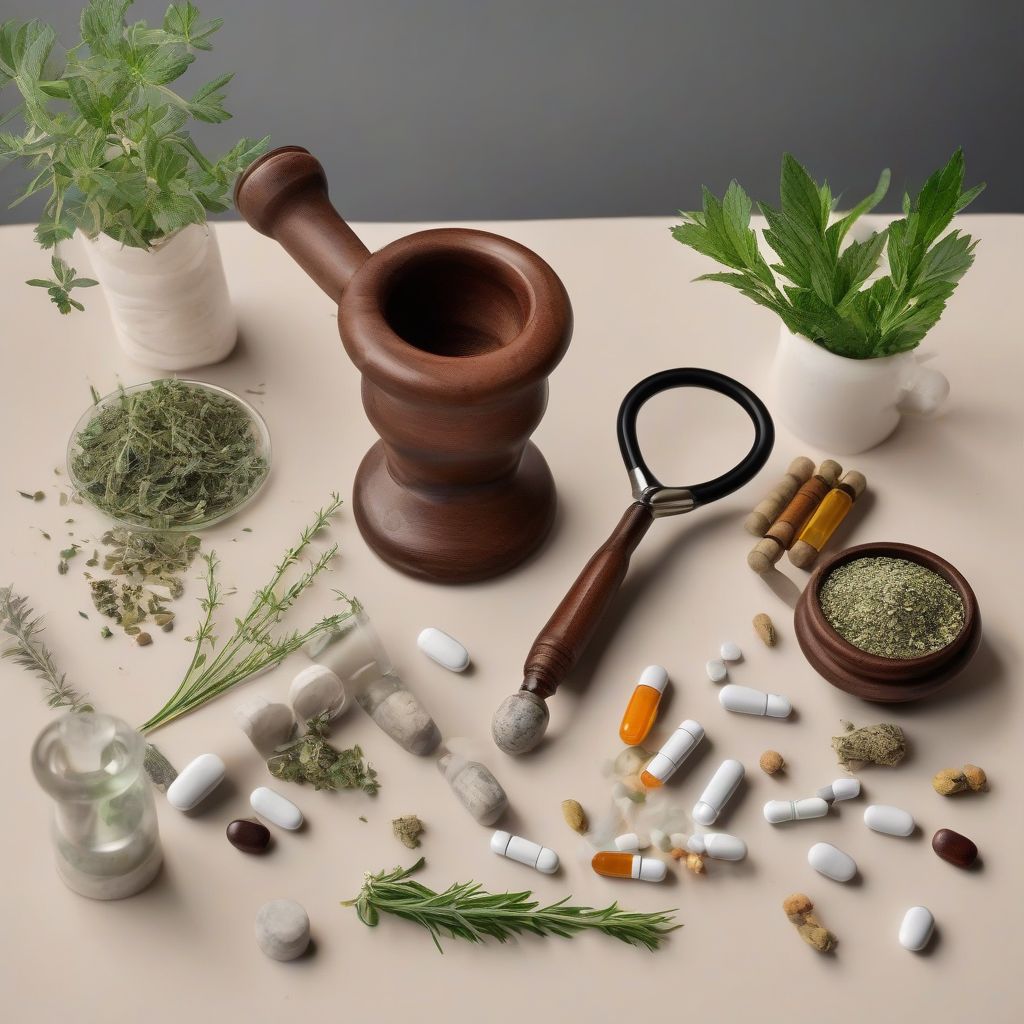For centuries, people have relied on the healing power of plants. Traditional medicine systems like Ayurveda and Traditional Chinese Medicine have used herbs to treat a myriad of ailments, from the common cold to chronic diseases. In our modern world, pharmaceuticals have taken center stage, but there’s a growing interest in returning to our roots and embracing a more holistic approach to health. This begs the question: can we harness the power of both herbal and modern medicine for optimal well-being?
The answer, excitingly, is yes!
Integrating these two worlds requires a balanced approach and open communication with your healthcare providers. Let’s delve deeper into the synergy of herbal and modern medicine and explore how you can safely benefit from this powerful combination.
Understanding the Power of Plants
Plants are nature’s alchemists, producing a complex array of compounds that offer numerous health benefits. These compounds, often referred to as phytochemicals, have antioxidant, anti-inflammatory, and immune-boosting properties.
Think of turmeric, a vibrant yellow spice used for centuries in Indian cuisine and Ayurvedic medicine. Its active compound, curcumin, possesses potent anti-inflammatory effects, rivaling some pharmaceutical drugs in its efficacy.
Or consider the soothing properties of chamomile tea. This beloved beverage contains compounds that bind to the same brain receptors as anti-anxiety medications, promoting relaxation and sleep.
Bridging the Gap: Where Herbal and Modern Medicine Meet
While herbal medicine holds immense potential, it’s crucial to acknowledge the strengths of modern medicine. Pharmaceuticals undergo rigorous testing and clinical trials, offering standardized dosages and proven efficacy for specific conditions.
The key to optimal health lies in recognizing that these two approaches are not mutually exclusive. They can, and should, work in harmony.
Here are a few examples of how herbal and modern medicine can complement each other:
1. Managing Side Effects
Many pharmaceuticals come with unwanted side effects. Herbal remedies can play a supportive role in managing these side effects naturally. For example, ginger is known to alleviate nausea, a common side effect of chemotherapy.
2. Enhancing Treatment Efficacy
Certain herbs can enhance the effectiveness of conventional treatments. Studies have shown that milk thistle, known for its liver-protective properties, can improve liver function in people undergoing chemotherapy.
3. Addressing Underlying Imbalances
While pharmaceuticals target specific symptoms, herbal medicine often takes a more holistic approach, addressing underlying imbalances that contribute to disease. For instance, adaptogenic herbs like ashwagandha help the body adapt to stress, potentially mitigating stress-related health issues.
 Herbal Medicine and Modern Medicine
Herbal Medicine and Modern Medicine
Navigating the Integration: Safety and Considerations
While the synergy of herbal and modern medicine is promising, integrating these approaches requires careful consideration and open communication with your healthcare team:
- Consult Your Doctor: Before incorporating any herbs into your health regimen, consult your doctor, especially if you have pre-existing health conditions, are pregnant, breastfeeding, or taking medications.
- Potential Interactions: Some herbs can interact with pharmaceuticals, either increasing or decreasing their effectiveness or causing adverse reactions. Your doctor can assess potential interactions and adjust your medications if needed.
- Quality Matters: The quality of herbal products can vary significantly. Choose reputable brands that provide detailed information about sourcing, processing, and third-party testing for purity and potency.
- Start Slowly: When introducing new herbs, start with a low dose and gradually increase it as tolerated. Pay close attention to your body’s response and report any unusual symptoms to your healthcare provider.
Empowering Your Wellness Journey: Tips for Combining Herbal and Modern Medicine
Ready to embark on a holistic health journey that embraces the best of both worlds? Here are some practical tips:
-
Be Your Own Advocate: Educate yourself about the potential benefits and risks of both herbal and modern medicine. Engage in open and honest conversations with your healthcare providers, sharing your interest in integrative approaches.
-
Find a Qualified Practitioner: Consider consulting with a qualified healthcare professional specializing in integrative medicine. They can provide personalized guidance on safely and effectively combining herbal and modern treatments.
-
Keep a Detailed Health Journal: Track your use of herbs, medications, lifestyle habits, and any changes in your health. This information can help you identify patterns, potential interactions, and track your progress over time.
-
Listen to Your Body: Your body is incredibly wise. Pay attention to how you feel when using herbs or medications. If something doesn’t feel right, don’t hesitate to discontinue use and consult with your doctor.
-
Embrace a Holistic Lifestyle: Remember that optimal health extends beyond pills and potions. Nourish your body with a nutrient-dense diet, prioritize regular exercise, manage stress levels, and cultivate meaningful connections.
[amazon bestseller=”herbal medicine”]
The Future of Wellness: A Harmonious Blend
As we delve deeper into the intricate workings of the human body and the natural world, the artificial divide between herbal and modern medicine begins to dissolve. The future of wellness lies in embracing an integrative approach—one that honors the wisdom of ancient healing traditions while harnessing the advancements of modern science.
By fostering open communication with your healthcare providers, educating yourself about different modalities, and listening attentively to your body’s innate wisdom, you can create a personalized healthcare plan that optimizes your well-being—now and for years to come.
